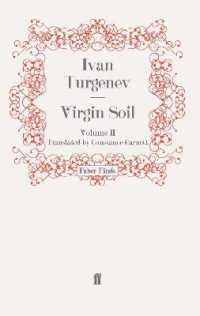Full Description
This book upturns the conventional understanding of heritage, challenging widespread notions about how we relate to and why we preserve the past.
Heritage research is often based on the assumption that heritage is something 'given' to us, that it is good and valuable in its own right. However, by looking at the historical and cultural roots of heritage and its development through the Enlightenment, modernity and capitalism, Pablo Alonso Gonzalez shows that it is in fact a system pervaded by fetishistic social relationships, embedded in capitalism, and not as benign as it appears.
Focusing on a case study in the region of Maragatería, Spain, Alonso Gonzalez explores the ethnic and racial discrimination towards the local population in the context of Spanish nationalism, and how this formed the region's heritage today. By challenging mainstream scholarship in the field, The Heritage Machine rethinks the relations between heritage, ideology and capitalism.
Contents
List of Figures
Series Preface
1. Introduction
2. The Emergence of Heritage
3. Race, Ethnicity and Nationalism in Spain
4. The Subordination of Peasants in Maragateria
5. Before Heritage: 'Juntas Vecinales' and 'Tamboriteros'
6. Social Construction of Heritage in the Teleno Military Shooting Range
7. Pseudo-archaeology and the Critique of Heritage Epistemology
8. Return to the Countryside in Prada de la Sierra
9. The Heritage Machine in Val de San Lorenzo
10. The Spectacle of the Other and the Negation of Heritage
Bibilography
Index








